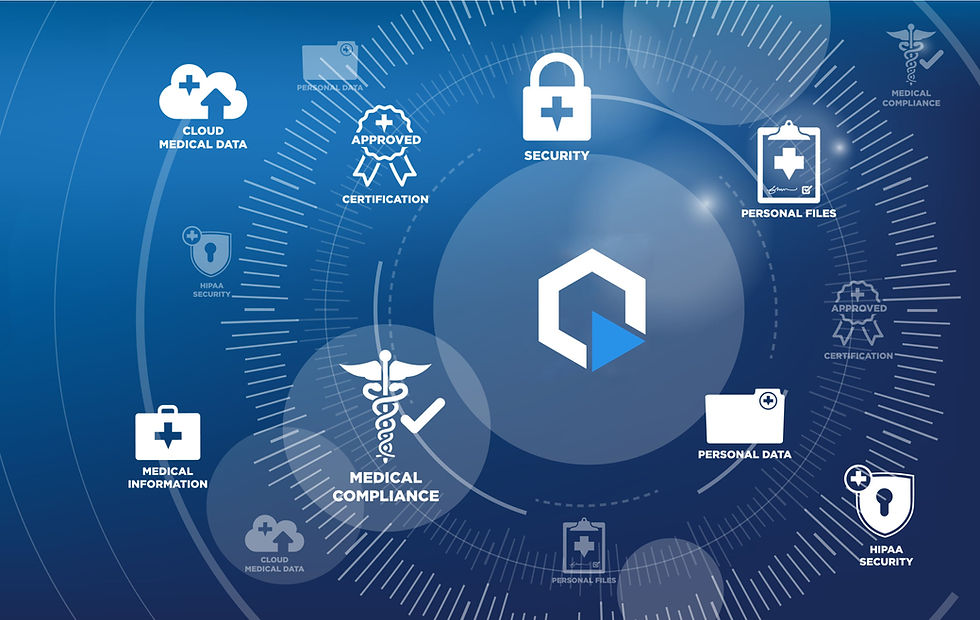Navigating HIPAA Compliance:A Guide for Healthcare Companies
- MedPath Compliance Group

- Feb 20, 2025
- 4 min read
Updated: Apr 1, 2025
The Health Insurance Portability and Accountability Act (HIPAA), enacted in 1996, establishes national standards to protect sensitive patient health information. For healthcare companies aiming to expand their services, understanding and adhering to HIPAA regulations is essential to maintain patient trust and ensure legal compliance. This comprehensive guide delves into HIPAA's key components and offers strategic steps for healthcare organizations to achieve and maintain compliance.

1. Understanding HIPAA's Core Components
Privacy Rule: This rule sets national standards for the protection of individually identifiable health information. It mandates that healthcare providers implement appropriate safeguards to ensure the confidentiality of personal health information and outlines conditions under which such information can be used or disclosed without patient authorization. Wikipedia
Security Rule: Focusing on electronic protected health information (ePHI), the Security Rule requires healthcare organizations to implement administrative, physical, and technical safeguards to protect ePHI's confidentiality, integrity, and availability. Wikipedia
Breach Notification Rule: This rule requires covered entities to notify affected individuals, the Department of Health and Human Services (HHS), and, in certain cases, the media, following a breach of unsecured PHI. Wikipedia
2. Steps to Achieve HIPAA Compliance
Conduct Regular Risk Assessments: Evaluate potential risks and vulnerabilities to ePHI within your organization. This involves identifying where ePHI is stored, received, maintained, or transmitted and assessing potential threats to its security. The HIPAA Journal
Implement Comprehensive Safeguards:
Administrative Safeguards: Develop and enforce policies and procedures to manage the selection, development, and implementation of security measures. This includes designating a security official responsible for overseeing HIPAA compliance and conducting regular training programs for staff. The HIPAA Journal
Physical Safeguards: Control physical access to facilities and workstations to prevent unauthorized access to ePHI. Implement policies regarding the use and positioning of workstations and devices handling ePHI. The HIPAA Journal
Technical Safeguards: Utilize technologies such as encryption and secure user authentication to protect ePHI. Implement audit controls to monitor access and activities related to ePHI. The HIPAA Journal
Develop and Enforce Policies and Procedures: Establish clear guidelines for handling PHI, including procedures for data access, disclosure, and breach response. Regularly review and update these policies to adapt to new threats or changes in regulations. The HIPAA Journal
Provide Ongoing Employee Training: Ensure that all staff members are educated on HIPAA requirements and your organization's specific policies. Regular training fosters a culture of compliance and helps prevent inadvertent violations. The HIPAA Journal
Establish a Breach Response Plan: Develop a comprehensive plan to respond to potential data breaches, including procedures for timely notification and mitigation strategies. Being prepared can significantly reduce the impact of a breach on your organization and patients. The HIPAA Journal
3. The Role of Compliance in Scaling Healthcare Services
As healthcare companies expand their services, maintaining HIPAA compliance becomes increasingly complex yet crucial. Implementing robust compliance programs not only mitigates legal risks but also enhances operational efficiency and patient confidence. By proactively addressing compliance challenges, organizations position themselves for sustainable growth and success in the healthcare industry. CloudConfidential
4. Recent Developments in HIPAA Compliance
In response to the evolving cybersecurity landscape, the U.S. Department of Health and Human Services' Office for Civil Rights (OCR) has proposed new cybersecurity measures to enhance the protection of patients' private data within healthcare organizations. These proposed rules include mandatory multifactor authentication, network segmentation, and data encryption to safeguard patient data even if it is stolen. Additionally, healthcare organizations will be required to perform risk analyses and maintain compliance documentation. These measures are part of the Biden administration’s cybersecurity strategy and aim to update the HIPAA Security Rule, which was last revised in 2013. The Verge
5. State-Specific Regulations
Beyond federal HIPAA regulations, healthcare companies must also be aware of state-specific laws that offer more extensive and varied protections for consumer health data (CHD). For instance, California's Confidentiality of Medical Information Act (CMIA), Nevada's Senate Bill 370 (SB370), Washington's My Health My Data Act (MHMDA), and Connecticut's Data Privacy Act (CTDPA) impose unique requirements on healthcare organizations. These laws mandate explicit consent from consumers before collecting CHD, require specific privacy policies, and grant unique consumer rights specific to CHD. Compliance with these state laws requires a thorough understanding of their provisions and a proactive approach to data privacy and security. Reuters
Conclusion
Achieving and maintaining HIPAA compliance is a multifaceted endeavor that requires continuous attention to regulatory changes, staff training, and robust security measures. Healthcare organizations can benefit from partnering with compliance consulting firms that specialize in both Corporate Practice of Medicine (CPOM) and HIPAA regulations. These firms offer services such as conducting comprehensive risk assessments, developing tailored compliance programs, providing staff training, and establishing effective breach response plans. By leveraging the expertise of such compliance specialists, healthcare organizations can navigate the complexities of HIPAA requirements more efficiently, allowing them to focus on delivering quality patient care while ensuring the protection of sensitive health information.
If you are a healthcare startup or know a digital health founder who needs guidance, reach out to schedule a complementary CPOM Strategy Call. We’ll discuss your compliance strategy and explore ways to align operational growth with evolving state regulations.
📞 Need CPOM Compliance Guidance?
Disclaimer: The information in this article is intended for general informational purposes related to CPOM compliance. While MedPath offers guidance and insights to support healthcare startups, this content should not be interpreted as legal advice. For legal questions specific to your circumstances, consult a licensed attorney.





Comments